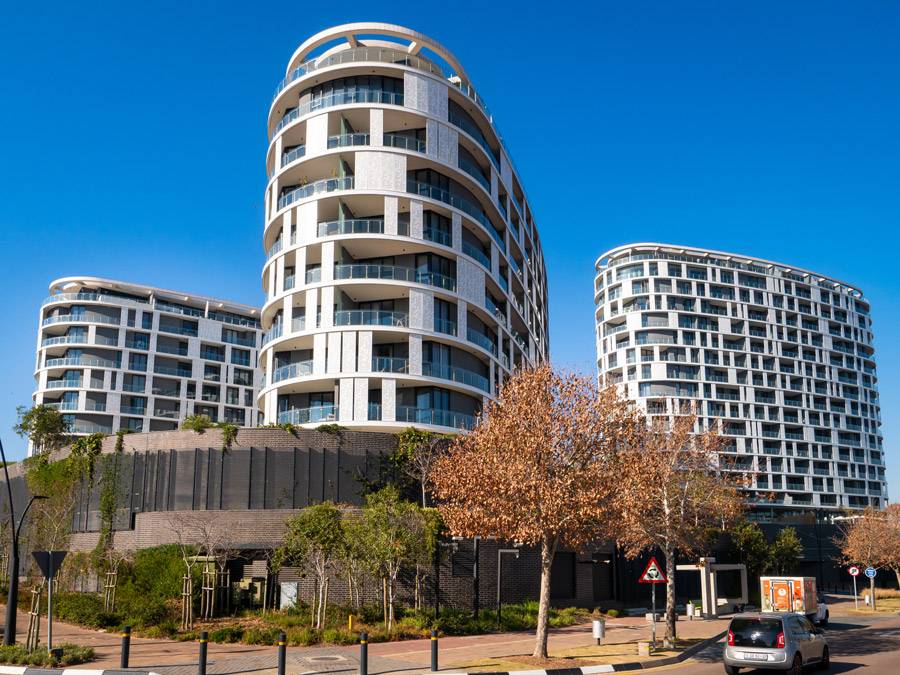
Up and away: Ellipse Waterfall, situated in Waterfall City, Midrand, was developed by the Tricolt Group. Photo: Supplied

Real estate is an industry largely run on confidence. If people are confident about a country’s economy, its leaders and its politics, then they will invest in real estate.
They will build new assets. If companies are employing enough people, then developers will create new office blocks.
South Africa’s government of national unity is nearly a year old and although its members haven’t always got along well, the GNU has held together. But the national budget has had a bumpy path.
Several economists believe the economy will grow at close to 1% this year, while the treasury’s budget suggested we could see 1.9% growth in 2026.
Against the backdrop of an economy showing minor confidence, we are also in a reporting season for numerous listed property funds. These landlords are mostly real estate investment trusts (Reits), which are mandated to pay a minimum of 75% of their distributable income as a dividend each financial year. Many South African Reits typically pay 90%, if not even 100%, of their distributable income as a dividend.
A number of these Reits have June financial year-ends and released interim results for the six months to the end of December in the past couple of weeks. I found that the sentiment among these companies, including the likes of Growthpoint Properties, SA Corporate Real Estate, Hyprop Investments and Attacq, was one of positivity and optimism.
Just look at Growthpoint Properties, South Africa’s largest landlord. The company, which also has investments in Poland, Romania, the United Kingdom and Australia, delivered stronger than expected results for its six-month interim period ending December 2024. Growthpoint reported distributable income per share (DIPS) of 74 cents a share, up 3.9% from the first half of 2024, while maintaining its distribution payout ratio at 82.5%.
What was really pleasing is that the South African portfolio surprised on the upside.
In line with the first-half performance, Growthpoint has also upgraded its DIPS guidance for the financial year ending June 2025 from -2% to -5% negative growth to positive growth of 1% to 3%.
The company’s group chief executive, Norbert Sasse, said he expected to see continued improvement in the operational performance of South African assets, lower finance costs as interest rates fall and continued outperformance from the V&A Waterfront.
Growthpoint owns half of the V&A, South Africa’s most valuable commercial real estate investment. The other half, valued at close to R20 billion, is owned by the Public Investment Corporation. The owners know it’s the jewel in their crown and, in last September, Sasse said about R4.5 billion would be invested in this property precinct over the next two years.
I also recently wrote about the V&A Waterfront precinct’s ambitious expansion plans. They are in the process of submitting a rezoning application to the City of Cape Town to reclaim 440 000m2.
Most of this will be allocated for construction in the Granger Bay precinct for mixed-use developments, including retail spaces, restaurants, hotels and residential apartments. There will be public and cultural facilities, which will involve re-establishing public access to the shoreline.
The Granger Bay precinct is in the northwest section of the V&A Waterfront.
I also took a read of the V&A Waterfront’s latest report when it comes to their December festive season numbers roundup released on 3 February 2025. Last year they had a phenomenal December period with more than three million visitors and record retail sales of almost R1.4 billion.
It is clear that the V&A Waterfront plays a significant role in Cape Town’s tourism economy. On New Year’s Eve alone, they welcomed about 200 000 people. In total, there were more 25 million visitors, and about R10 billion was spent throughout the precinct in 2024.
Growthpoint is also active in other cities. Late last year, it announced The Olympus, a skyscraper it is building with luxury residential developer Tricolt Group. The Olympus will be a residential tower supported by retail stores in the Sandton Summit precinct, which is anchored by the Discovery head office.
The Tricolt Group was established in 2010 by Tim Kloeck, who was born in Nelspruit and has a Belgian background. The development company has completed more than 5 000 residences with an end value of about R16 billion.
Tricolt is also known for its award-winning apartment development, Ellipse Waterfall, in the heart of Waterfall City, where the most expensive penthouse in Gauteng was sold for R95 million.
It seems that well-established Reits in South Africa are primed to reward investors in the long run.
Attacq also reported strong numbers and also pushed the positive South African narrative.
Attacq is the development partner of Waterfall City, one of the country’s quickest-growing nodes, which is located in Midrand. It released financial results for the six months to end December 2024. The company’s flagship asset is Mall of Africa, the largest mall built in one phase on the African continent, with 130 000m2 of retail space. Only Fourways Shopping Centre is larger, at 178 202m2.
After Fourways Mall’s redevelopment in 2019, it struggled with a high level of vacancies. Recently, it has rebranded to increase foot traffic. So far, progress is optimistic. This is thanks to the mall’s newly appointed asset managers, Flanagan & Gerard Property Development Group, which took over management in February 2024.
Attacq reported that its distributable income per share increased 49.1% to 55.0 cents and declared a 46.7% higher interim dividend of 44.0 cents, which is the market’s best in this reporting period.
Attacq benefits from strong partnerships, especially in Waterfall, with the likes of Sanlam, as well as the Government Employees’ Pension Fund, which recently invested more than R2 billion into the group.
“The period saw us continuing to execute against our Horizon 2030 strategy. Our efforts are reflected in our increased gross revenue and rental income achieved, improved cost-to-income ratio from 25.4% to 22.4%, and the new blue-chip clients attracted to our precincts,” said Van Niekerk.
Attacq’s chief financial officer, Raj Nana, also said the company was in a healthy place financially.
“Our strategic growth trajectory will continue into the second half, backed by our robust balance sheet, which was supported by a successful initial public auction under our domestic medium-term note programme and strategic debt refinancing undertaken during the period,” he said.
Blue-chip retail landlord Hyprop Investments, which is listed on the JSE and the secondary A2X exchange, published strong half-year results for the period ending December. It reported double-digit growth in distributable income of 14.5% to R765 million and a 14.4% increase in distributable income per share to 201.4 cents. Hyprop Investments owns top malls such as Rosebank Mall, Hyde Park Corner, Canal Walk, Cape Gate, Somerset Mall, Table Bay Mall and Clearwater Mall.
In a statement, the group declared an interim dividend of 113.43 cents a share, which equates to 95% of the distributable income from the South African portfolio for the 2025 financial half-year results.
The company is aiming to sell some Gauteng assets and invest more in Cape Town. I’m told Hyde Park Corner and The Glen are up for sale.
SA Corporate Real Estate, a diversified fund, increased its distribution to 24.37 cents a share for the year ending 31 December, up from 23.18 cents a share the previous year. Its distributable income increased 5.1% to R680.9 million, or 27.08 cents a share. Total net property income (NPI) was R1.5 billion, up from R1.3 billion the previous year. Total like-for-like NPI increased 6.7% to R1.1 billion. These are all strong numbers.
Through its holding in AFHCO, the company owns numerous residential, neighbourhood retail and industrial assets. It recently acquired the formerly listed Indluplace Properties, a residential landlord. According to the AFHCO website, it is the leading property company of affordable apartments and retail spaces in Johannesburg and intends to spread throughout the greater Johannesburg area.
SA Corporate Real Estate’s chief executive, Rory Mackey, expressed positive sentiment last week.
Hopefully the banks will note these positive results and fund more projects as our economy (slowly but surely) gets going.
Ask Ash examines South Africa’s property, architecture and living spaces. Continue the conversation with her on email ([email protected]) and X (@askashbroker).



